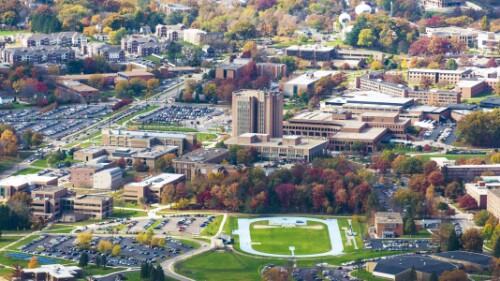
Translation
Kent State’s online Master of Arts in Translation prepares students for professional roles in translation across various languages and industries. This program covers translation theory, language technology, and specialized translation fields, providing students with both practical skills and cultural knowledge. Ideal for those aiming to work in global communications, localization, or international business, graduates gain expertise to bridge language barriers effectively.
Master of Arts in Translation Program Overview
The Master of Arts degree in Translation prepares students for careers in translation, language project management, international business, government and any globalizing industry.
The Translation major comprises the following concentrations:
- The Language concentration provides students with an in-depth focus on one language.
- The Technology and Multilingual Communication concentration allows students to specialize in such areas as global security, emerging media, international business and user experience.
Program Learning Outcomes
Graduates of this program will be able to:
- Define and describe the roles and responsibilities of various language industry stakeholders and various forms of language service provision; and demonstrate an understanding of the basics of entrepreneurship and translation as a business.
- Engage in effective research and information retrieval for a variety of language industry-relevant tasks.
- Utilize a range of computer-assisted technologies, including machine translation, for language industry-relevant tasks; and demonstrate an understanding of the place, benefits and limitations of those technologies in a given project scenario.
- Demonstrate an understanding of professional and ethical considerations in various project scenarios.
- Successfully communicate and mediate communication across languages and cultures in multilingual, multicultural contexts.
- Apply theory to inform and justify their decision making.
- Critically reflect on their work and that of others.
Graduates of the Language concentration will be able to:
- Translate authentic, industry-relevant content, both general and domain-specific, using appropriate tools and approaches.
Graduates of the Technology and Multilingual Communication concentration will be able to:
- Emerging media specialization: Utilize emerging media and technology tools for localization purposes, including machine translation, artificial intelligence-driven localization and virtual reality simulations.
- Global security specialization: Utilize translation techniques and security strategies to address real-world challenges in international contexts, effectively bridging language barriers and enhancing global security measures.
- International business specialization: Apply localization techniques and international business principles to develop market-specific strategies for global expansion; consider linguistic, cultural and economic factors; and prepare to lead multinational teams and navigate complex global markets with confidence — leveraging localization expertise and international business acumen to drive organizational growth and success.
- Multidisciplinary approaches specialization: Synthesize at least two of the other specialization outcomes toward their specific career goals.
- Technology specialization: Acquire advanced technical skills in translation technology, including proficiency in computer-assisted translation tools, machine translation systems and localization software.
- User experience specialization: Apply localization strategies and user experience design principles to create user-centric products and services tailored to diverse cultural and linguistic contexts.
Dual Degree - MBA/MA Translation
Students can complete a dual degree program with an M.A. in Translation and an M.B.A. in Business Administration. A separate application must be submitted for each program.
The Dual Degree with an M.B.A. degree in Business Administration and the M.A. degree in Translation is for students with sufficient proficiency in a foreign language who wish to integrate a graduate business education with advanced translation training. This program suits those whose career goals include assuming middle or executive management positions in international business or language industry enterprises or those interested in starting their own business in the language services industry.
Master of Arts in Translation Program Admissions Requirements
For more information about graduate admissions, visit the graduate admission website. For more information on international admissions, visit the international admission website.
- Bachelor’s degree from an accredited college or university
- Minimum 2.750 undergraduate GPA on a 4.000-point scale
- Official transcript(s)
- Goal statement (one to two pages)
- MP3/WAV file with a five-minute oral sample in English (conversational, not read from a script)
- Writing sample (10 pages) in English, which should be accompanied by a signed declaration that the sample is original work and that the applicant received no help in its preparation
- Three letters of recommendation
- English language proficiency - international students must provide proof of English language proficiency (unless they meet specific exceptions to waive) by earning one of the following:1
- Minimum 79 TOEFL iBT score
- Minimum 6.5 IELTS score
- Minimum 58 PTE score
- Minimum 110 DET score
- Applicants to the Language concentration only:
- CD or MP3/WAV file with a five-minute oral sample in the language in which the applicant intends to concentrate (conversational, not read from a script)
- Writing sample(s) in in the language in which the applicant intends to concentrate, which should be accompanied by a signed declaration that the sample is original work and that the applicant received no help in its preparation
1International applicants who do not meet the above test scores may be considered for conditional admission.
Program Courses
Program Requirements
| Code | Title | Credit Hours |
|---|---|---|
| Major Requirements | ||
| TRST 60009 | INTRODUCTION TO TRANSLATION TECHNOLOGY | 3 |
| TRST 60010 | THEORY OF TRANSLATION AND INTERPRETING | 2 |
| TRST 60011 | TERMINOLOGY AND COMPUTER APPLICATIONS IN TRANSLATION | 3 |
| TRST 60100 | PRACTICE OF TRANSLATION | 2 |
| TRST 60630 | CAREER PATHS IN THE LANGUAGE INDUSTRY | 3 |
| Major Electives, choose from the following: 1 | 12-15 | |
| MCLS 50510 | INTRODUCTION TO NATURAL LANGUAGE PROCESSING | |
| Concentrations | ||
| Choose from the following: | 9-12 | |
| Minimum Total Credit Hours: | 37 | |
1Students admitted to the Language concentration will complete 15 credit hours of electives. Students admitted to the Technology and Multilingual Communication concentration will complete 12 credit hours of electives.
2Maximum 3 credit hours each of TRST 60092 and TRST 60098 may be applied toward the degree.
| Code | Title | Credit Hours |
|---|---|---|
| Concentration Requirements | ||
| TRST 60040 | LITERARY AND CULTURAL TRANSLATION | 3 |
| Language Electives, choose two courses in the same language from the following: | 6 | |
| Arabic Language | ||
| ARAB 67091 | SEMINAR IN ARABIC TRANSLATION | |
| ARAB 67250 | COMMERCIAL, LEGAL AND DIPLOMATIC TRANSLATION | |
| ARAB 67251 | SCIENTIFIC, TECHNICAL AND MEDICAL TRANSLATION | |
| French Language | ||
| FR 63091 | SEMINAR IN FRENCH TRANSLATION | |
| FR 63250 | COMMERCIAL, LEGAL AND DIPLOMATIC TRANSLATION | |
| FR 63251 | SCIENTIFIC, TECHNICAL AND MEDICAL TRANSLATION | |
| German Language | ||
| GER 61091 | SEMINAR IN GERMAN TRANSLATION | |
| GER 61250 | COMMERCIAL, LEGAL AND DIPLOMATIC TRANSLATION | |
| GER 61251 | SCIENTIFIC, TECHNICAL AND MEDICAL TRANSLATION | |
| Japanese Language | ||
| JAPN 65250 | COMMERCIAL, LEGAL AND DIPLOMATIC TRANSLATION | |
| JAPN 65251 | SCIENTIFIC, TECHNICAL AND MEDICAL TRANSLATION | |
| Russian Language | ||
| RUSS 62091 | SEMINAR IN RUSSIAN TRANSLATION | |
| RUSS 62250 | COMMERCIAL, LEGAL AND DIPLOMATIC TRANSLATION | |
| RUSS 62251 | SCIENTIFIC, TECHNICAL AND MEDICAL TRANSLATION | |
| Spanish Language | ||
| SPAN 68091 | SEMINAR IN SPANISH TRANSLATION | |
| SPAN 68250 | COMMERCIAL, LEGAL AND DIPLOMATIC TRANSLATION | |
| SPAN 68251 | SCIENTIFIC, TECHNICAL AND MEDICAL TRANSLATION | |
| Minimum Total Credit Hours: | 9 | |
| Code | Title | Credit Hours |
|---|---|---|
| Concentration Requirements | ||
| Concentration Electives, choose from the following: 1 | 12 | |
| Emerging Media Specialization | ||
| EMAT 51000 | RESPONSIVE WEB DESIGN | |
| EMAT 52210 | WEB APPLICATION DEVELOPMENT | |
| EMAT 60010 | FOUNDATIONS OF EMERGING MEDIA AND TECHNOLOGY | |
| EMAT 60310 | CREATIVE CODING FUNDAMENTALS | |
| EMAT 62110 | INTERACTIVE DATA | |
| EMAT 60999 | PROJECTS IN EMERGING MEDIA AND TECHNOLOGY | |
| Global Security Specialization | ||
| CRIM 56800 | INTELLIGENCE AND NATIONAL SECURITY | |
| CRIM 56801 | HOMELAND SECURITY | |
| CRIM 56802 | TERRORISM AND COUNTERTERRORISM | |
| CRIM 56803 | INFORMATION AND CYBER SECURITY | |
| International Business Specialization | ||
| CIS 64042 | GLOBALIZATION AND TECHNOLOGY STRATEGY | |
| MGMT 64184 | INTERNATIONAL BUSINESS | |
| MGMT 64275 | GLOBAL STRATEGIC MANAGEMENT | |
| MKTG 65054 | INTERNATIONAL MARKETING | |
| Multidisciplinary Approaches Specialization | ||
| Courses from any of the specializations | ||
| Technology Specialization | ||
| BA 64060 | FUNDAMENTALS OF MACHINE LEARNING | |
| CS 61002 | ALGORITHMS AND PROGRAMMING I | |
| CS 61003 | ALGORITHMS AND PROGRAMMING II | |
| MCLS 50510 | INTRODUCTION TO NATURAL LANGUAGE PROCESSING | |
| User Experience Specialization | ||
| UX 60501 | INTRODUCTION TO USER EXPERIENCE | |
| UX 60502 | USER EXPERIENCE PROCESSES AND PRACTICE | |
| UX 60503 | FUNDAMENTALS OF INTERACTION DESIGN | |
| UX 60511 | INFORMATION ARCHITECTURE FUNDAMENTALS | |
| UX 60521 | DATA-DRIVEN INTERACTION FUNDAMENTALS | |
| UX 60541 | USER EXPERIENCE EVALUATION FUNDAMENTALS | |
| Minimum Total Credit Hours: | 12 | |
1Students will select a specialization with prior approval from the graduate coordinator or from an advisor. Courses listed under the specializations are recommended, not required. Students completing fewer than 12 credit hours for their specialization will complete additional electives to meet the required 37 credit hours for the degree.
Graduation Requirements
| Minimum Major GPA | Minimum Overall GPA |
|---|---|
| - | 3.000 |
- No more than one-half of a graduate student’s coursework may be taken in 50000-level courses.
- Grades below C are not counted toward completion of requirements for the degree.
Translation Master’s Degree Program Tuition and Fees
Ohio Residents
| Per Credit Hour | Per 3-Credit Course | Approximate Tuition Cost |
| $612.62 | $1,837.86 | $22,600 part-time1 $13,400 full-time2 |
Non-Ohio Residents
| Per Credit Hour | Per 3-Credit Course | Approximate Tuition Cost |
| $622.62 | $1,867.86 | $23,000 part-time3 $13,800 full-time4 |
1The $612.62 per-credit-hour tuition rate applies to part-time Ohio resident graduate students taking fewer than 11 credit hours per semester.
2The flat-rate semester fee of $6,724.36 applies to full-time Ohio resident graduate students taking between 11-18 credit hours per semester. This amount is calculated at student completing the program in 2 semesters.
3The $622.62 per-credit-hour tuition rate applies to part-time non-Ohio resident graduate students enrolled in a fully online degree program and taking fewer than 11 credit hours per semester, PLUS a surcharge of $10 per credit hour.
4The flat-rate semester fee of $6,724.36 applies to full-time non-Ohio resident graduate students enrolled in a fully online degree program and taking between 11-18 credit hours, PLUS a surcharge of $10 per credit hour of actual credits taken each semester (between 11-18 semester credits or $110-$180). This amount is calculated at students completing the program in 2 semesters plus the surcharge of $370.
* The Software Localization course, TRST 60012, has a fee of $45. Students will not need to purchase any online software. They will be given access to a virtual machine with all the software needed.
- An additional Distance Learning fee for all students enrolled in a distance learning course is $15 per credit hour. Program tuition and costs are estimated and subject to change.
- Actual tuition costs will vary based on a student’s chosen academic plan. The full cost of attendance consists of tuition and fees, and when applicable, food, housing, books, course materials, supplies and equipment, transportation and personal expenses for the enrolled terms. Other expenses not included in tuition and fees totals can be found on the Kent State University cost of attendance web page.
- For a complete listing of tuition rates for approved online programs, please contact Kent State’s Financial, Billing & Enrollment Center at 330-672-6000 or via our website Contact Us link.
Master of Arts in Translation Careers
- 5.7% faster than the average
- 30,600 number of jobs
- $69,920 potential earnings
- 20.0% much faster than the average
- 77,400 number of jobs
- $52,330 potential earnings
Notice: Career Information Source
* Source of occupation titles and labor data comes from the U.S. Bureau of Labor Statistics’ Occupational Outlook Handbook. Data comprises projected percent change in employment over the next 10 years; nation-wide employment numbers; and the yearly median wage at which half of the workers in the occupation earned more than that amount and half earned less.







